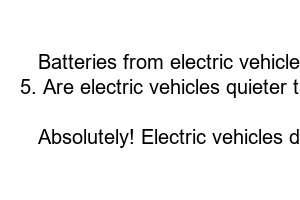전기차 장단점
Advantages and Disadvantages of Electric Vehicles
Electric vehicles (EVs) have gained considerable attention in recent years, thanks to their environmentally friendly nature and potential to revolutionize the transportation industry. As more people become conscious of their carbon footprint and the impact of fossil fuel consumption on our planet, the demand for electric vehicles continues to surge. However, like any emerging technology, EVs present both advantages and disadvantages that consumers should consider before making the switch.
1. Environmental Benefits
By their very nature, electric vehicles do not produce tailpipe emissions, offering a cleaner and greener alternative to internal combustion engines. **EVs contribute significantly to reducing air pollutants and greenhouse gases**, which are major culprits behind climate change and air pollution-related health issues. Additionally, as the renewable energy sector continues to expand, charging EVs with clean, renewable energy sources further enhances their environmental benefits.
2. Cost Savings
Although electric vehicles may have a higher initial purchase cost, their operational expenses can be significantly lower over time. **EVs generally have lower maintenance costs**, as they have far fewer moving parts than traditional combustion engines. Moreover, electricity is often a cheaper fuel source compared to gasoline or diesel, resulting in lower energy costs for EV owners. Finally, governments and organizations frequently offer incentives, such as tax credits and rebates, to encourage the adoption of electric vehicles, further offsetting their upfront costs.
3. Performance and Quiet Ride
Electric vehicles offer instant torque, resulting in **impressive acceleration and a smooth, quiet ride**. Unlike internal combustion engines, which require time to build up torque, electric motors provide instantaneous power, enhancing the overall driving experience. Additionally, the lack of an exhaust system and the presence of sound insulation make EVs noticeably quieter, offering a more serene driving environment.
4. Limited Driving Range and Charging Infrastructure
Despite advancements in battery technology, the driving range of electric vehicles still falls short of their gasoline-powered counterparts. **EVs typically have a limited range before requiring a recharge**, which can be a drawback for those who frequently travel long distances. Moreover, the availability and accessibility of charging stations vary across regions, making long journeys more challenging. However, with the growing popularity of EVs, the charging infrastructure is rapidly expanding, alleviating some of these concerns.
5. Charging Time
While refueling a conventional car is a quick and straightforward process, recharging an electric vehicle takes considerably longer. **Charging EVs can take several hours**, especially when using a standard electrical outlet. Although fast-charging stations can significantly reduce charging times, they are still relatively scarce. The time required for recharging poses challenges for individuals who need to cover long distances in a short timeframe.
6. Battery Lifespan and Disposal
The batteries powering electric vehicles have a finite lifespan, with performance deteriorating over time. **Battery replacement and disposal can be costly and environmentally challenging**, requiring proper recycling to avoid potential pollution. However, ongoing advances in battery technology are continually improving performance, durability, and recyclability.
In summary, electric vehicles offer numerous advantages, such as environmental benefits, cost savings, impressive performance, and a quieter ride. However, their limited driving range, charging infrastructure limitations, longer charging times, and the cost and disposal challenges associated with batteries are important considerations. As the technology evolves and infrastructure expands, electric vehicles are poised to become even more appealing options for eco-conscious consumers.
—
Summary: Electric vehicles (EVs) offer significant environmental benefits, cost savings, improved performance, and a quiet ride. However, limited driving range, a lack of charging infrastructure, long charging times, and battery lifespan and disposal concerns remain significant challenges. As technology advances and infrastructure improves, EVs have the potential to become a greener and more convenient transportation option.
FAQs:
1. Are electric vehicles more expensive than traditional combustion engine vehicles?
Electric vehicles often have a higher initial purchase cost, but lower operational expenses over time can offset this. Additionally, there are various incentives available to help make EVs more affordable.
2. Can electric vehicles travel long distances?
While EVs still have a limited driving range compared to gasoline-powered cars, the charging infrastructure is expanding, making long journeys more feasible.
3. How long does it take to charge an electric vehicle?
Charging times for electric vehicles vary depending on the charging method used. Standard charging can take several hours, but fast-charging stations are available for quicker recharges.
4. What happens to the batteries in electric vehicles once they reach the end of their lifespan?
Batteries from electric vehicles can be recycled, but proper disposal is crucial to avoid environmental pollution. Improvements in battery technology aim to enhance performance and recyclability.
5. Are electric vehicles quieter than traditional cars?
Yes, electric vehicles are noticeably quieter due to the absence of an exhaust system and the presence of sound insulation.
6. Can electric vehicles help reduce air pollution and greenhouse gas emissions?
Absolutely! Electric vehicles do not produce tailpipe emissions, contributing significantly to reducing air pollutants and greenhouse gases.

